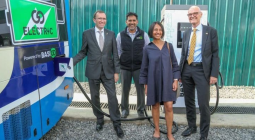Chinese carmaker BYD sets its sights on the Tunisian electric vehicle market
With Tunisia aiming to reduce its greenhouse gas (GHG) emissions by 46% by 2030, Chinese carmaker BYD is preparing to invest in the manufacture of electric vehicles and the development of intelligent transport solutions.
Tunisia is increasingly open to a transition towards sustainable modes of transport. At least, that’s what members of the Tunisian government hinted at during a high-level meeting with teams from Build Your Dreams (BYD). The Chinese carmaker is planning to invest in the North African country, in particular to “develop the electric mobility sector and intelligent solutions in the field of renewable energy”, said I.D Hyung.
According to BYD’s Managing Director for the Middle East and Africa, Tunisia would be a crucial partner for the Chinese group’s research and development (R&D) activities. This deal is of interest to Tunisia’s Minister of Industry, Mines and Energy, given that “the transport sector is the one that consumes the most hydrocarbons” in Tunis, explained Fatma Thabet Chiboub.
According to BYD’s official figures, the brand will have sold nearly 3.1 million electric vehicles (cars, bicycles and electric buses) by 2023 alone, representing a 61.9% increase in revenues by 2022. This will enable it to maintain its position as the world’s best-selling carmaker, ahead of the American Tesla and other brands.
A vision for electric mobility
Tunisia has every interest in facilitating future Chinese investment on its soil. All the more so since the very first electric bus (90 passengers and 250 km range) put into circulation in the Tunisian capital in 2018 was supplied by BYD. The country led by Kaïs Saïed has also stepped up its initiatives in recent years to facilitate the development of electromobility.
The most recent of these is the 17% reduction in tax on imports of electric vehicle recharging equipment. These include a 10% reduction in customs duties and a 7% reduction in value-added tax (VAT). The measure, which comes into force on 1 January 2023, is already favourable to the Tunisian e-mobility ecosystem. It is part of the programme to promote electric mobility led by the Agence nationale de maîtrise de l’énergie (ANME).
Cover photo: By AFRIK 21





